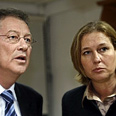
UN envoy urges Israel to show vision, grasp peace bid
UN Special Coordinator for Middle East Peace Process Robert Serry says Israel must seize opportunity to resume negotiations on final peace treaty with Palestinians, is 'pessimistic another such opportunity would come anytime soon', adds 'would like to see more commitment' from Israeli side
Israel must display vision and seize the current window of opportunity to resume negotiations on a final peace treaty with the Palestinians before it closes, United Nations Middle East envoy Robert Serry said on Friday.
US President Barack Obama took office in January and "from day one" made a Middle East peace deal a priority, Serry said. Despite hard going so far Obama is not giving up, and he has full European Union, Russian and United Nations backing.
"I am pessimistic that another such opportunity would come anytime soon," the UN Special Coordinator for the Middle East Peace Process told Reuters in an interview from his Jerusalem office. "The window is closing down ... we should not believe time is on our side."
"The parties, deep down, know what it takes. They need the political will," the envoy said. "Frankly I don't see urgency on the Israeli side. I would like to see more commitment."
"If Israel has a sense of urgency and finality it will live up to its commitments," Serry said. To those Israelis who believe the status quo is acceptable, he said: "I do not agree."
It is obvious, Serry added, that there is no point in "talks for the sake of it". The negotiations must have "a credible political horizon", with two-state solution at the end.
They must resume where they left off with the last Israeli government in late 2008, and not start from scratch while the new Israeli government continues to permit the building of settlements on occupied West Bank land, he said.
Letting Israel negotiate "while they also move the goalposts on the ground" would fail. And in the Arab-Israeli context, assuming there was more time to stall simply meant running greater risks of events that could derail the process.
'Hamas can change climate by freeing Shalit'
Talks must resume in a way that "they cannot fail again", Serry said. That was why Obama's mediator George Mitchell was insisting on clear goals, and while the latest US status report on his mission was not rosy, "Mitchell is coming back".
"The Israelis must have the vision to see a two-state solution is the only way to peace and security," the UN diplomat said. They have a "progressive partner" in Palestinian President Mahmoud Abbas and Prime Minister Salam Fayyad.
"It is hard to say how many more weeks" it might take for Mitchell to fix a credible re-start for the peace process. "We're not there yet but we are not losing confidence in US-led efforts."
As for the Palestinians "at some point they will have to go to the ballot box" to end the split between Islamist Hamas which rejects peace with Israel and the Western-backed Palestinian Authority which is ready to make a treaty to end the conflict.
Hamas, which rules in the Gaza Strip, had the power to change the political climate by releasing captured Israeli soldier Gilad Shalit in a prisoner exchange, he said.
And the Israel government must rethink a "politically wrong-headed and morally wrong" policy that is blocking UN completion of the rebuilding of Gaza schools and clinics in the blockaded enclave before winter comes.
"Some projects are 70% finished. They need glass, doors, toilets," Serry said. "This has already taken months." The UN was disappointed that Israel so far had not accepted that it could prevent "diversion" of the material to Hamas.










